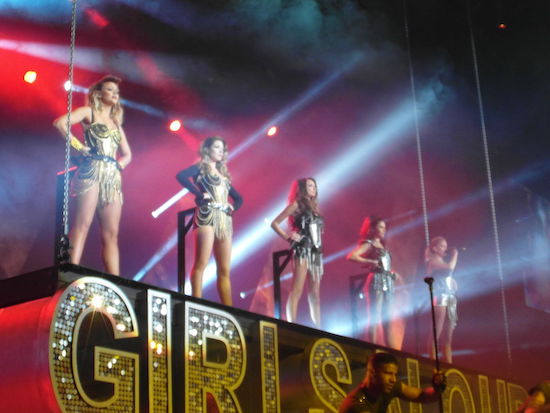Photo by CKWNNS. CC BY-SA 3.0
Michael Cragg’s first book, Reach For The Stars, is an oral history that’s like a Meet Me In The Bathroom for anyone who ever held up a banner saying ‘POINT YOUR ERECTION IN MY DIRECTION’ in front of a chart-topping act at an arena, or camped outside a house hoping for a glimpse of their heroes going out for a pint of milk. Charting the decade from when the Spice Girls first piped up, through to the dominance of X-Factor and the demise of Smash Hits, Top Of The Pops, CD:UK, Popworld and – thank god – the fan-fleecing 2CD single racket. It was a ten-year reign of some of the greatest pop music ever made before the authentic sadface boohoo troubadours arrived and sapped all the joy out of everything.
You might be the sort who replies to the question ‘where do you stand on Blue?’ with ‘their throats’, or you might be the type who has spent several years chained outside Universal demanding a reissue of Rachel Stevens’ two solo albums on vinyl. Whatever your take on pop music, Reach For The Stars is for you. The struggles, demands and success of the acts showcased in this tome are sometimes harrowing, often hilarious and worthy of a whole new level of your respect.
Cast your mind back to February 1996, when Take That first said ‘That’s it, we’re off!’ and both East 17 and Eternal had gone a bit adult, leaving the coast clear for the syrupy mumpop of Boyzone; there was a vacancy for a tangible popmania to scream at. Britpop had gone sour and become dominated by hod carriers in parkas while Blur, Elastica, Suede and Pulp were all about to embark on drug habits, and anyone with the ability to hold a guitar the right way up was suddenly midweek number six. It was dreary, it was drab, it was TFI Friday with special guests Sleeper.
Fortunately, something was brewing in a semi in Maidenhead, occupied by five young women who’d answered the call for a “streetwise, outgoing, ambitious and dedicated” quintet of 18–23-year-olds to become a “choreographed, singing/dancing, all-female pop act for a recording deal”. Cocking a snoot at the idea that “girls don’t buy music by girls”, the Spice Girls barreled into pop with ‘Wannabe’ in July 1996, and within six months were pretty much the biggest act on the planet. Initially Smash Hits weren’t that bothered by them (the clots) and so it was left to Top Of The Pops magazine to cleave them to their bosom and, as a bonus, conjure up the legends that were Posh, Sporty, Scary, Baby and Ginger.
What followed from that cultural reset was the clamour for competing labels and management companies to concoct their own moneymakers, with pitches like ‘Spice Girls but boys’ (5ive), ‘Spice Girls but a line-dancing mixed-gender operation’ (Steps), ‘Spice Girls but with their own TV show and a couple of extra members’ (S Club 7). It was a wild time when UK pop was the dominant force and got its act together.
You see, pop music is important. And for a generation or two who’d become obsessed and besotted by a conveyer belt of precision-built popsters, this was their/your entry-point. Yet behind the perma-grinning gloss and choreography, it was also an era of sexism, exploitation, homophobia, bullying, racism and mental illness and a bloodthirsty landscape where if you ‘only’ went in at number three, you were en route to The Dumper.
In Cragg’s fantastic book, which you’ll find impossible not to wolf down in one sitting, you’ll find yourself warming to acts who you’d previously steered clear of at Our Price and sympathising with a brutal workload where a non-consecutive 48-hours off in one year was considered a luxury.
Take 5ive. 5ive were, um, five lads who were thrown together in a shared house that got into such a state that even the cleaners hired by the record company refused to set foot in it. A bunged-together rough-n-tumble set-up that professional cocktip Russell Brand actually auditioned for. Pretty much launched as a Neighbours From Hell nightmare, they impacted the charts with their slick R&B-glistened pop, even making inroads in the American market, and at one point had Simon Cowell offering to buy songwriter Max Martin a Mercedes for them to have ‘…Baby One More Time’, only for 5ive to say it was “fucking wank” in front of Martin, who slightly insulted, huffed off and said, “I’ve got this other girl who is going to sing it”.
Oh, and the workload, interband fist fights and bullying got so much that youngest member Sean – who’d joined as a sweet-natured 15-year-old – had a breakdown. When needing some time off, he was replaced by a cardboard cut-out. Things got so bad – backstage tears, separate cars, you name it – after various 5ive-rs had pissed off so many people in the industry, everyone involved with them vowed ‘never again’.
Even S Club 7, a band unlikely to be confused with Fat White Family any time soon, had their share of drug arrests (translation: the three boys were nicked for sharing a spliff). The tale of an inebriated Bradley being pulled out of a nightclub with some cans to lay down the lead vocal for ‘Don’t Stop Movin’’, only to head back to the club an hour later, is the sort of hardcore most bands dream of.
How about Atomic Kitten’s Natasha Hamilton suffering from post-natal depression, and back on tour after an emergency C-section. “When you have a C-section you have six weeks’ downtime and back into light exercise, but with me I was back on stage in heels doing full-on dance routines”. Their handlers didn’t give a shit – the help back then was to “put them on Prozac and everything will be fine”.
Howsabout Sugababes, literal babies when they got together as a far cooler, less directional Spice. Unarsed by choreography or tie-ins with crisps manufacturers, Mutya (15), Keisha (15) and Siobhan (16) were initially more of a critical success, before a national service-style call-up kicked in to protect the ‘brand’ that went on to score six number one singles including stone-cold classics such as ‘Freak Like Me’, ‘About You Now’ and ‘Push The Button’, and each of the members ending up being replaced before they finally evolve back into the origibabes again.
What about the plight of Mis-Teeq – a genuine contender to become a UK Destiny’s Child only for their label to go bankrupt and fuck them over? He may seem like a joke now, but Craig David was the biggest break-out popstar of 2000, and yet was not only snubbed by the Brits, but faced diminishing returns when he ‘went American’ which, combined with being lampooned by comedy-for-cunts figurehead Leigh Francis in blackface, soon put paid to his career and he was back in his closet.
How about Hear’Say’s Kym Marsh being told on national television that she’s too fat for pop? Or members of Blue and Atomic Kitten suffering from PTSD after witnessing the planes fly into the World Trade Center while they were both in New York filming a video? Honestly, who’d be a pop star.
Don’t panic though, you’ll still think Louis Walsh is a bit of a charmless wanker. For after spending the last three months of 2002 on prime-time TV selecting a girl band on Popstars: The Rivals, Walsh promptly buggered off when Girls Aloud were announced victorious.
From that moment they were thrown into a life without any real order other than turning up when a car arrived. The Aloud were left to fend for themselves – living in a compound of accommodation where things like ‘paying bills’ and ‘owning a hoover’ were alien to what was effectively a bunch of kids, and it was left to Kimberley to take the reins with a clipboard detailing the band’s every move.
Girls Aloud were in fact the last great pop group – shedding their beginnings with an array of stupendous singles, mostly helmed by Xenomania who threw everything at them, cut-and-shutting bits of songs together to create magic and throwing in bits of New Order, Frankie Goes To Hollywood and synthpop references. Their undeniably brilliant run of hits – ‘The Show’, ‘Biology’, ‘Love Machine’, ‘Call The Shots’, ‘The Promise’, ‘Untouchable’, etc. – saw them ‘accepted’ by the prevailing – urgh – ‘proper’ music brigade, and their crossover into National Treasure status was secured when Cheryl became a judge on The X Factor.
Nicola, Kimberley, Cheryl, Nadine and the late Sarah were iconic – the last great band of them all. Quite frankly Nicola rejecting the OXO Tower menu in favour of eating a bag of Nik Naks she had in her handbag is far more punk than Sleaford Mods will ever be.
In fact, that was the death knell to it all. Popstars, Pop Idol and The X Factor combined the 21st-century twin evils of reality television and Have Your Say culture and laid bare the mechanism of pop music. Rather than present the finished product to the public, the viewers were now invested in prospective pop stars’ lives the minute they left the house and attended an audition. And through selective editing and a supportive media, a gladiatorial aspect was brought in via the viewers’ apparent ownership of these people’s careers. It’s almost enough to make you feel sorry for Steve Brookstein.
Reach For The Stars, then, it’s a stupendous brick of a book. You’ll laugh (a lot). You may even cry. You might even feel compelled to knock up a Spotify playlist. And, if you’re like me, you’ll also really want to find out what ‘Birthday’, Richard X and Hannah Robinson’s ode to anal sex sung by Frankie from The Saturdays, sounds like.



